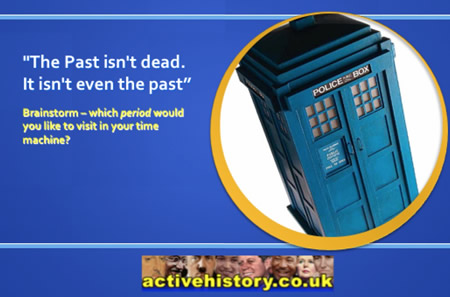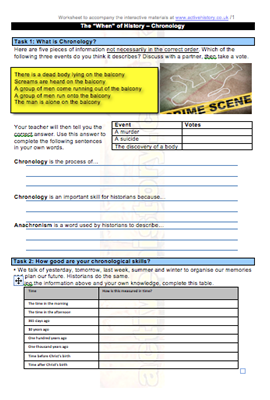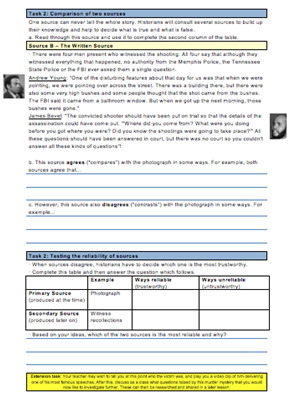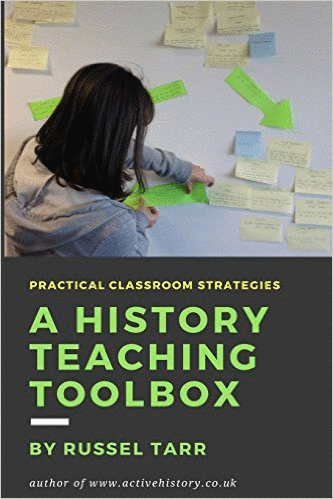What is History?
What is history all about? The who, when and why!
A teacher-led online presentation, based around three central themes and leading neatly into the 'time machine' activity which follows:
1. When (Periods): Historians are Time Travellers!
2. Who (People): Historians are Friendly Time Travellers!
3. What (Evidence): Historians are Friendly Time Travelling Detectives!
Where, when and who would you visit if you had a time machine?
A nice stand-alone activity that can take place at any point during this study topic. Ask students to consider when, where and who they would visit (any why!) if they had a time machine. Then instruct each student to produce their own completed version of a foldable card which can form the basis of an interesting classroom display.
The "When" of History: Chronology and Anachronism
Central Activity
The Body on the Balcony EPISODE 1 - a Historical Mystery!
In this exercise, based on a real historical event, students have to put events into their correct chronological order to make some initial speculations about what has happened. Through doing this they learn about the importance of chronology and understand the meaning of anachronism. Additionally, each student produces a timeline of their life and then a timeline of world events covering the same period.
Optional Extras / Extension Activities
Why 365 days in a year? Why 24 hours in a day? What are the origins of the months of the year, and the days of the week? [there is also a teacher answer sheet]
I do this activity with students towards the end of the Autumn Term. They conduct their own research into a variety of questions relating to chronological terms. As a winter holiday project they could produce their own calendar designed to explain the origin of the months of the year.
Einstein and the Theory of Relativity: Is Time Travel Actually Possible?
After an introduction to the idea that every time we look at a star we are actually looking back in time at something as it was maybe hundreds of years ago, students consider the implications of this fact in a pretty deep sense and how Einstein showed that time itself can be slowed down....definitely one for gifted and talented students!
 The "What" of History: Sources, deductions and speculations The "What" of History: Sources, deductions and speculations
Central Activity
The Body on the Balcony EPISODE 2 - the Mystery Deepens!
With their curiosity inevitably piqued, students are now presented firstly with a photograph of the scene (remember, this is a genuine historical event). They are encouraged to distinguish what they now know for a fact, what they can deduce, and what they speculate. They then move on to examine, compare and contrast two written sources. Finally, the teacher reveals the name of the person whose body was found on the balcony, plays an extract from one of his speeches, and encourages students to find out answers to some of the key questions raised by the sources (why was he killed? why was the murderer never put on trial? why were the witnesses never interviewed by police...?)
Optional Extras / Extension Activities
Evidence about myself
As a first homework, students produce a scrapbook of personal evidence consisting of photos, certificates, tickets and so on - but with no written explanation. In the follow-up lesson, the scrapbooks are swapped around and students have to deduce things about each other from the evidence that they have.
The "Who" of History - Measuring Historical Importance
The "Who" of History - People
Students brainstorm famous people from history, research one each in more detail, and conduct a lively balloon debate to decide on the "most important". They can also use this balloon debate powerpoint template. For more on the Balloon Debate, check out this blogpost: Balloon Debates: Templates and Tips.
|




 The "What" of History: Sources, deductions and speculations
The "What" of History: Sources, deductions and speculations 





